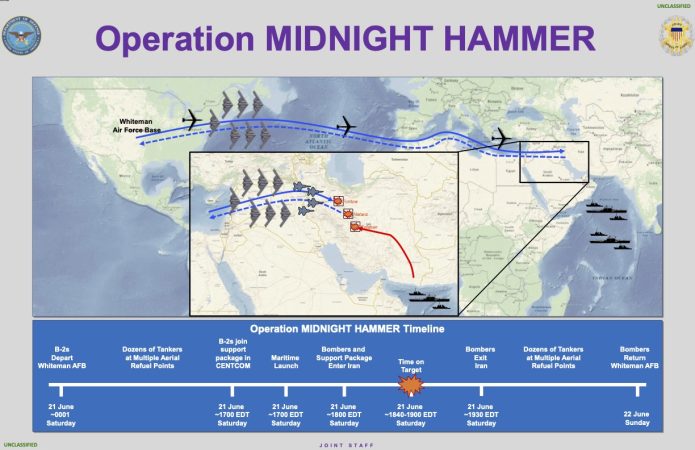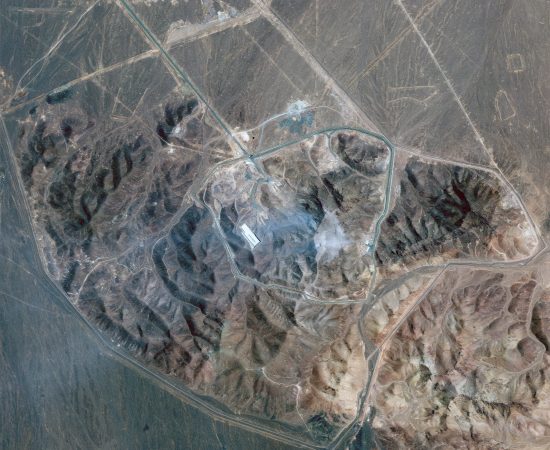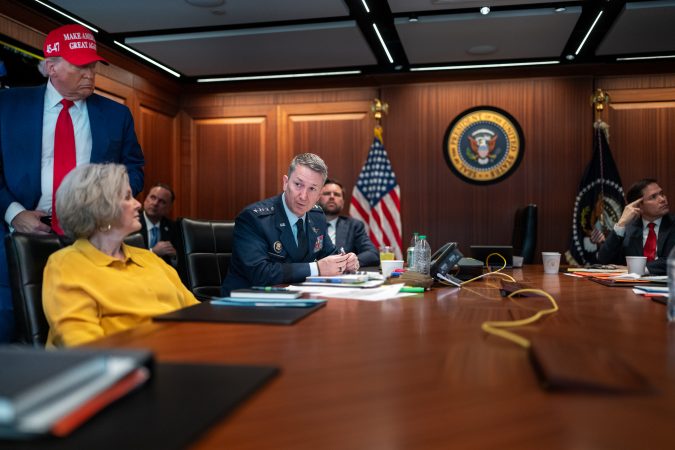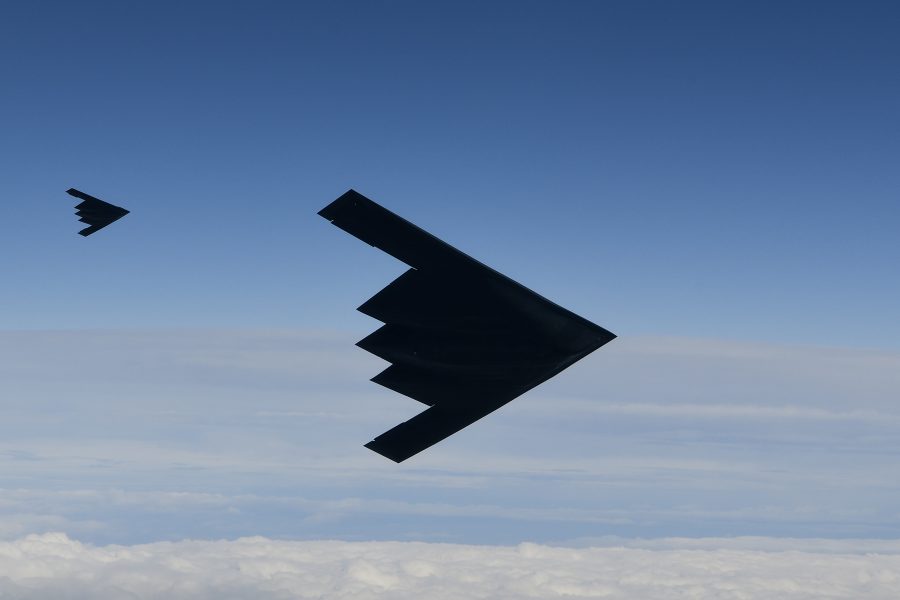The U.S. military struck three Iranian nuclear sites in the early hours of June 22 local time in Operation Midnight Hammer, intended to shut down Iran’s nuclear program without harming the country’s leadership.
The Trump administration said the damage would substantially delay Iran’s ability to produce a nuclear weapon. But Gen. Dan Caine, Chairman of the Joint Chiefs, said the Pentagon was still awaiting a definitive battle damage assessment.
One key, open question is whether Iran had managed to divert enriched uranium and equipment to safe locations before the U.S. strike, or whether there are other, unknown sites where nuclear work can proceed.
U.S. Air Force bombers and submarine-launched cruise missiles struck the three sites in the early hours of June 22, local time: the Fordow, Natanz, and Isfahan facilities.
At an early morning Pentagon briefing, Defense Secretary Pete Hegseth and Caine offered fresh details on the strikes, revealing that some 125 U.S. planes participated in the mission, 75 precision-guided munitions were expended, and both fourth- and fifth-generation fighters joined B-2 stealth bombers on the mission.
The B-2s dropped 14 Massive Ordinance Penetrators on the Fordow and Natanz sites. It was the first operational use of the GBU-57 MOP, which was designed expressly for this kind of deeply buried targets. Each MOP weighs 30,000 pounds, and each B-2 can carry just two of the weapons, indicating that seven B-2s took part in the operation, an account confirmed by defense officials.
The mission was carefully calculated and its execution included intentional misdirection. Multiple B-2s headed West from Whiteman Air Force Base, Mo., on June 21, with a flight plan that indicated Guam was their destination. The ruse caught the attention of internet spotters and journalists, prompting reports that suggested the aircraft were positioning for a potential future fight. Meanwhile, the strike mission unfolded without notice: Seven B-2s headed east over the Atlantic and Mediterranean Sea before crossing over the Middle East to strike Iran.
Along with the decoys, the strike package also took off from Whiteman—where the entire B-2 fleet is based—just after midnight on the morning of June 21, refueled multiple times en route to Iran with dozens of U.S. tankers, and entered Iranian airspace at 6 p.m. Eastern Time later that day. They returned to the U.S. June 22.

The sites bombed by the B-2s were Fordow, which is buried deep underground, and Natanz, defense officials told Air & Space Forces Magazine. Caine said 30 Tomahawk land-attack cruise missiles were fired from a submarine at the Isfahan site and impacted after the impacts of Massive Ordnance Penetrator bunker buster bombs on two sites.
“Every American involved in this operation performed flawlessly,” Hegseth said.
Caine said the B-2s were led into hostile territory by both fourth- and fifth-generation fighters, most likely F-16s and F-35s. Defense officials declined to identify the specific types or number of fighters, however, but Caine indicated their mission was to protect the bombers on their way into the territory.
“As the Operation Midnight Hammer strike package entered Iranian airspace, the U.S. employed several deception tactics, including decoys, as the fourth-and fifth-generation aircraft pushed out in front of the strike package at high altitude and high speed, sweeping in front of the package for enemy fighters and surface-to-air missile threats,” Caine said. The Chairman added that the U.S. did not believe Iranian forces—either fighters or air defense forces—fired on the U.S. aircraft.

A defense official told Air & Space Forces Magazine that numerous anti-radiation missiles, including HARMs, were fired by American aircraft to suppress enemy air defenses—the U.S. has Air Force F-16 Wild Weasel fighters and Navy EA-18 electronic attack planes in the region, but whether those aircraft were involved has not been confirmed.
“As the strike package approached Fordow and Natanz, the U.S. protection package employed high-speed suppression weapons to ensure safe passage of the strike package with fighter assets employing preemptive suppressing fires against any potential Iranian surface-to-air threats,” Caine said.
Among the 125 U.S. aircraft involved in the operation were Air Force tankers—the KC-46 Pegasus and KC-135 Stratotankers—at least two kinds of fighters, bombers, and more.
Israel had wiped out most Iranian air defenses in the eight days leading up to the June 21 attack, but without the munitions or bombers capable of destroying a site such as Fordow, Israel had asked for American help. Israel’s punishing air campaign, dubbed Operation Rising Lion, was launched June 12 with the intent of diminishing Iran’s ability to develop and use nuclear weapons. Israel also attacked Iran’s military leadership, killing numerous senior military leaders and systematically undermining Iran’s ability to defend itself.
“Israel had incredible military success,” Hegseth said, in response to a question from Air & Space Forces Magazine. He cited the Israeli Air Force’s success “in degrading Iranian capabilities, degrading Iranian [medium range ballistic missile] launchers,” and added: “It’s been incredible to watch what our ally Israel has been able to do. … But as it pertains to this strike, this was U.S.-operated, U.S.-led.”
Nevertheless, Caine said, Israel laid much of the groundwork for the U.S. strike’s success.
“We took advantage of some of the preparatory work that’s been done over the past week and a half in terms of access and approach,” he said.
What was left was to do the work that only the U.S. Air Force could accomplish, with its unique combination of bombers, bombs, and support capabilities.

President Donald Trump was exuberant in his appreciation of the apparently well-executed attack.
“I want to congratulate the great American patriots who flew those magnificent machines tonight and all of the United States military on an operation the likes of which the world has not seen in many, many decades,” Trump said June 21. “Hopefully, we will no longer need their services in this capacity.”
What Iran does in response is still to be determined. On June 18, Iranian Supreme Leader Ayatollah Ali Khamenei dismissed Trump’s call for Iran to “surrender” its nuclear program and warned that any U.S. military action against Iran would bring consequences to the U.S.
In his late-night address to the nation, Trump said Iran’s belligerence “cannot continue.”
“There will be either peace or there will be tragedy for Iran far greater than we have witnessed over the last eight days,” he said. “Remember, there are many targets left—tonight’s was the most difficult of them all, by far, and perhaps the most lethal. But if peace does not come quickly, we will go after those other targets with precision, speed, and skill. Most of them can be taken out in a matter of minutes.”
The U.S. has taken steps to mitigate potential damage should Iran or its proxy forces attack U.S. forces in the region, moving larger planes away from Al Udeid Air Base in Qatar, which is located directly across the Persian Gulf from Iran, and placing troops on heightened alert, U.S. officials have said.
In the United States, politicians lined up mostly on party lines in response to the attack.
Republican lawmakers praised Trump’s decision to strike Iran.
“The President made the correct decision to strike Iran’s nuclear sites,” said Sen. Roger Wicker (R-Miss.), Chairman of the Senate Armed Services Committee, in a statement. “Iran made the choice to continue its pursuit of a nuclear weapon and would only be stopped by force. It would be a grave mistake to attempt any retaliation against our forces or homeland.”
But some Democrats were critical, saying Trump rushed into the conflict without Congress’s authorization.
“The American public is overwhelmingly opposed to the U.S. waging war on Iran,” Sen. Tim Kaine (D-Va.), a member of the Senate Armed Services Committee and a former Vice Presidential candidate, wrote on social media. “And the Israeli Foreign Minister admitted yesterday that Israeli bombing had set the Iranian nuclear program back ‘at least two or three years.’ So what made Trump recklessly decide to rush and bomb today? Horrible judgment. I will push for all Senators to vote on whether they are for this third idiotic Middle East war.”
House Minority Leader Rep. Hakeem Jeffries (D-N.Y.) said the bombing raises the risk of further complications in the Middle East. “The risk of war has now dramatically increased,” he said. “President Trump misled the country about his intentions, failed to seek congressional authorization for the use of military force, and risks American entanglement in a potentially disastrous war in the Middle East.”
But Sen. John Fetterman (D-Pa.), however, broke with his party colleagues, calling Trump’s decision to bomb Iran “the correct move.”




